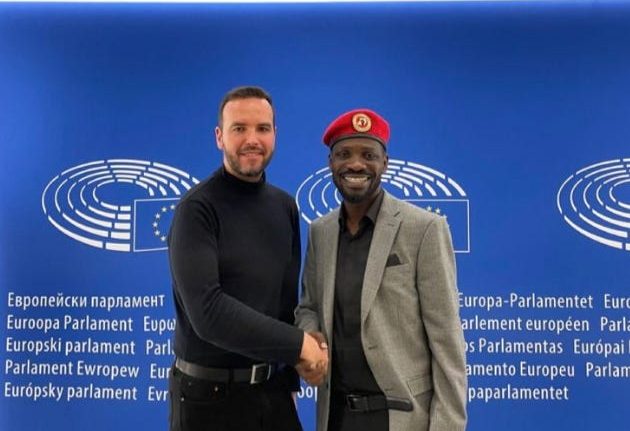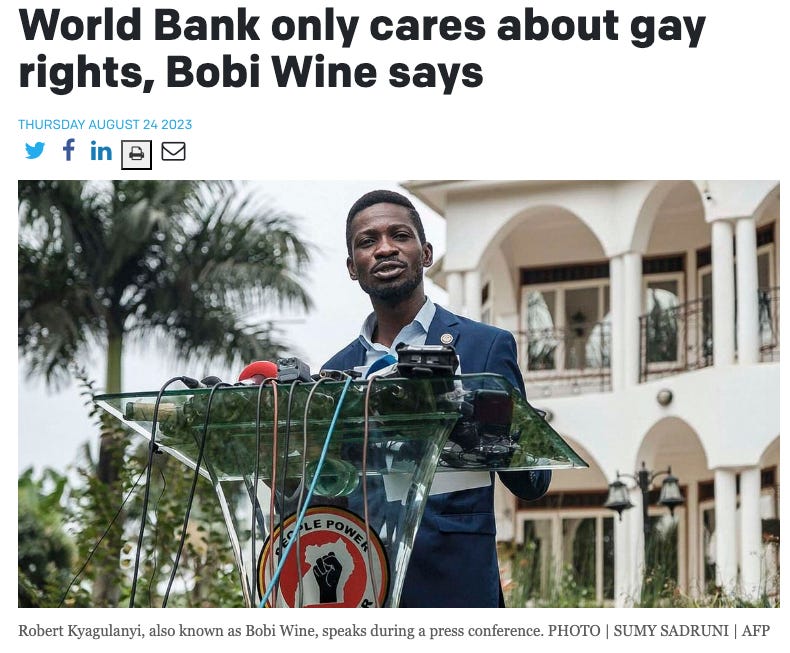Is Ugandan presidential hopeful Bobi Wine a friend or foe to LGBTQs?
Colin Stewart is a 45-year journalism veteran living in Southern…
Two LGBT activists sound off on whether Bobi Wine will save Uganda’s LGBTQ people

Ugandan politician Bobi Wine was the subject of recent commentaries in Fabrice Houdart’s weekly newsletter on LGBTQ+ Equality. Houdart is executive director of the Association of LGBTQ+ Corporate Directors.
In the first commentary, Houdart questioned whether Bobi Wine has truly acknowledged the human rights of LGBTQ+ people. In response, veteran UK-based human rights activist Peter Tatchell came to Bobi Wine’s defense.
Modestly edited versions of both commentaries are reprinted below.
Houdart wrote on May 9:
Explaining the Bobi Wine controversy
Did the Ugandan Opposition Leader, who once sang “Burn all the batty man,” have a change of heart on homosexuals, or is he taking the international community for a ride?
If you are still an X user (I am not), you might have noticed the tweets below sent [on May 8] by Frank Mugisha and Steven Kabuye, both prominent Ugandan LGBTQ+ rights advocates, about Bobi Wine, the Ugandan opposition leader. Mugisha wrote that Wine’s party is “using [LGBTQ+ people] for international political gain,” while Kabuye wrote, “All they want for us is death.”
Not a rave review of someone whom the West is hailing as the next Mandela and who is portrayed in a an Oscar-nominated documentary.
On the other hand, the EU’s David Vidal Sans, who self-describes as a social media expert, tweeted on April 5: “Honored to meet Uganda’s most prominent leader @HEBobiwine. He is not only fighting for human and LGBTI+ rights but also exposing the dictatorial reality of his country in the 2024 Oscar-nominated documentary Bobi Wine: The People’s President.”
So, friend or foe, what is the deal with Wine? (That sounded weird; I am not going to write about alcohol abuse in this newsletter if this is what you came for.)
The “Bobi Wine Starter Kit” includes Susan Orlean’s recent dithyrambic piece in the New Yorker, “From House Arrest to the Oscar Circuits” and The New York Times’ “Bobi Wine: The People’s President Review – A Pop Star Turns Politician.” However, no article I reviewed about Bobi in the myriad that has popped up lately referred to his views on LGBTQ+ rights.
As Wine garners acclaim on the international stage, it is worth digging into his troubling history with LGBTQ+ rights.
Bobi Wine 101
Bobi Wine, who is only 42 (I only say that because I am 46 and cannot cook or lead a country), is a popular figure in Uganda who has transitioned from a successful music career to politics. He has appeal, particularly among the youth, due to his relatable background and charismatic nature. He and his party, the National Unity Platform (NUP for the cool kids), have been persecuted by Museveni. His party has a realistic chance of challenging Yoweri Museveni’s long-standing presidency. However, the possibility of electoral success for Wine or any opposition candidate is slim as electoral manipulation by the Museveni government is rife.
UK travel ban
Wine has a history that is difficult to overlook. His past is marred by outright homophobic statements and lyrics, such as those from his 2014 song, where he incited violence against homosexuals with lyrics like “Burn all the batty man.” “Batty Man” is a not-very-nice way to refer to a gay man. Burning them all is self-explanatory. These lyrics even led to a travel ban by the UK, which was only lifted recently. His response to criticism has often been defiant, citing cultural norms rather than acknowledging the human rights of the LGBTQ+ community, although lately he has softened. In these comments four months ago, he said:
“Yes, I took responsibility because I actually called for the burning and killing of all homosexuals. During that interview, I communicated that people grow and transform, and as a leader, I transformed from calling for the death and killing of people who differ from me. I stand by my word …[I want to?] be a leader of all people in the population even those that are not like me.”
Has he really changed?

Wine’s strategic silence on LGBTQ+ issues after entering the political arena does not bode too well. Wine has done little to correct or retract his previous homophobic rhetoric publicly. This silence is conspicuous and troubling, given Uganda’s harsh stance on LGBTQ+ rights, where recent legislation has further criminalized homosexuality with severe penalties and led to global condemnation. He only spoke about the Anti-Homosexuality Act to regret that it took that law for the World Bank to suspend lending (albeit very temporarily).
Really, Bobi? Could it be because the Anti-Homosexuality Act is egregious and a horrible global precedent?
The elevation of Wine as a symbol of resistance against tyranny in the West, including the Oscar nod, starkly contrasts with his actual record on human rights. It is a reminder of the selective advocacy often prevalent in international politics (and US politics), where young, good-looking, charismatic leadership can sometimes overshadow deep-seated issues like LGBTQ+ rights.
What’s your view, Fabrice?
Well, thanks for asking. I think the West should… listen to what Ugandan LGBTQ+ activists are saying. Convictions matter, and we have already witnessed how LGBTQ+ issues are the canary in the coal mine. It’s unrealistic for Wine or any political leader in Uganda to be a homophile – given societal attitudes in the country – but respect for human rights is not negotiable, and there are incredible human rights violations against homosexuals in that country.
I also see this issue as symptomatic of a more significant problem in which politicians – even our allies – continuously instrumentalize our lives for political or geopolitical gains. That’s not what this is about. We do not want to be anybody’s pawn. We want to live our lives.
The LGBTQ+ community in Uganda has suffered a lot and deserves genuine allies, not opportunistic figures who fluctuate their support based on political expediency. There are many other promising figures in the country, such as Victor Ochen, Founder and Executive Director of the African Youth Initiative Network, whom I recently met in Bellagio and who impressed me and articulated an inclusive vision for the country.
Ultimately, the issue in Uganda is not about LGBTQ+ people. It is about inclusive politics rather than scapegoating politics. It is about securing a generation of leaders who can articulate a vision for Uganda, where all lives are valued, ensuring leaders like Wine stand for the rights of all, not just the majority.
As Wine continues to be lauded in various circles by romantic endorsers of a “Ugandan Che Guevara,” LGBTQ+ people must demand more than charismatic dissent against dictatorship — we must demand real advocacy for all oppressed groups, including the LGBTQ+ community.
Houdart followed up with this response from veteran LGBTQ rights campaigner Peter Tatchell:
Peter Tatchell responds to my recent post on Bobi Wine and LGBT+ Rights
In response to my post questioning Bobi Wine’s embrace of LGBTQ+ rights, human rights activist Peter Tatchell offers a detailed perspective rooted in decades of advocacy and direct dialogues with political figures in Uganda. In his response on May 12, Tatchell provides context to Wine’s transformation from a previously homophobic stance to a more inclusive approach towards human rights, emphasizing the complexities and strategic necessities within Ugandan political and social landscapes.
This is Tatchell’s response on May 12:
I have been actively supporting the Ugandan democracy and human rights movement for more than three decades against the dictatorship of President Yoweri Museveni, which is suppressing all of civil society – not just LGBTs but also women, ethnic minorities, opposition party activists, students, journalists, lawyers, trade unionists, and human rights defenders.
I have met Bobi Wine. He is the leader of Uganda’s democratic opposition. I have had extensive conversations with him on LGBT+ rights, and he is no longer homophobic. He and his party members have welcomed me to their London events, knowing that I am gay and an LGBT+ activist, despite the risk of this being exploited by the dictatorship and used against them.
It is true that Bobi Wine used to be homophobic. He was rightly banned from the UK for several years by the Government because of his homophobia. Following criticism and lobbying by myself and Ugandan LGBTs in London, Bobi has changed his mind. He says his homophobic past originated from the intensely bigoted culture in which he grew up and to which he was exposed. He never knew anything different. But now that we have educated him about LGBT+ issues, he is not homophobic any more.
Bobi has apologised for his anti-LGBT+ past. In light of his apologies, the UK government lifted his entry ban. The bar for lifting an entry ban is very high. Such bans are only lifted if the UK government is convinced that the apology is genuine, and there is evidence of a change of heart. That Bobi has changed his views is also accepted by many Ugandan LGBTs living in London.
Bobi’s apology has been used against him by the country’s dictator president, Yoweri Museveni, who has arrested, detained, and tried to kill him.
When asked about LGBT+ rights in recent years, Bobi has not disowned or condemned them. He said he supports equality and human rights for everyone –that includes LGBTs. That is the best that any leading Ugandan politician can say, given the country’s toxic homophobia, which has overwhelming public backing. For Bobi to openly support LGBT+ rights would be electoral suicide. It would keep Museveni in power, which would perpetuate disaster for LGBT+ Ugandans.
The idea that Bobi is using LGBT+ rights for political gain is not true. He gains nothing and loses a lot by renouncing homophobia. It is being used by Museveni to discredit and undermine him.
We need to think carefully about the best, most effective tactics to secure LGBT+ rights – not just what is ideal, right in principle, and sounds best. There is a legitimate role for tactical compromise to win the long game.
The number one human rights priority is to end the Museveni dictatorship. Bobi Wine is the best hope to achieve that. He would have won the last election, but Museveni rigged the vote, hobbled the media and judges, and subjected Bobi and his party to a reign of terror by the police and army.
There will never be LGBT+ rights in Uganda while Museveni is in power. Bobi as president and his party in government are the preconditions for any advance in LGBT+ rights and all other democratic freedoms. And, of course, we must hold them to that.
Some LGBT+ Ugandans who criticise Bobi are not involved in the wider Ugandan democracy movement. They have a narrow LGBT+ rights perspective and seem not to see the bigger picture and the need for tactics that will win for LGBTs in the end.
The South African and global LGBT+ movement supported freedom for Nelson Mandela in the 1980s even though he did not support LGBT+ rights until much later – and even though leading figures in his ANC party were viciously homophobic at the time. They understood that the precondition for LGBT+ rights in South Africa was ending the apartheid dictatorship. In my view, and that of some Ugandan LGBTs in London, the same tactical thinking is needed in Uganda today.





